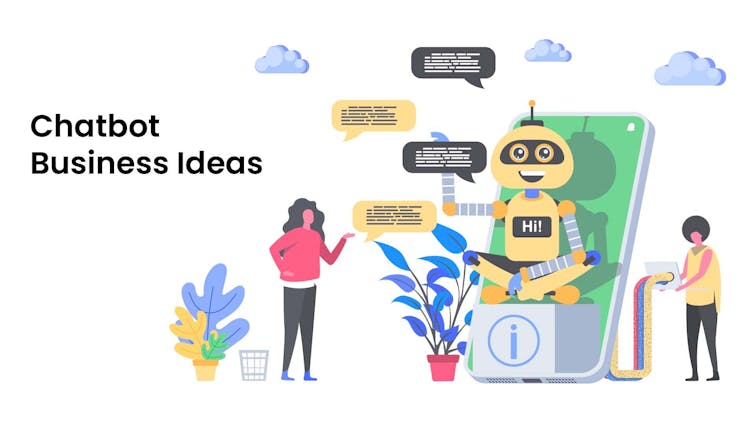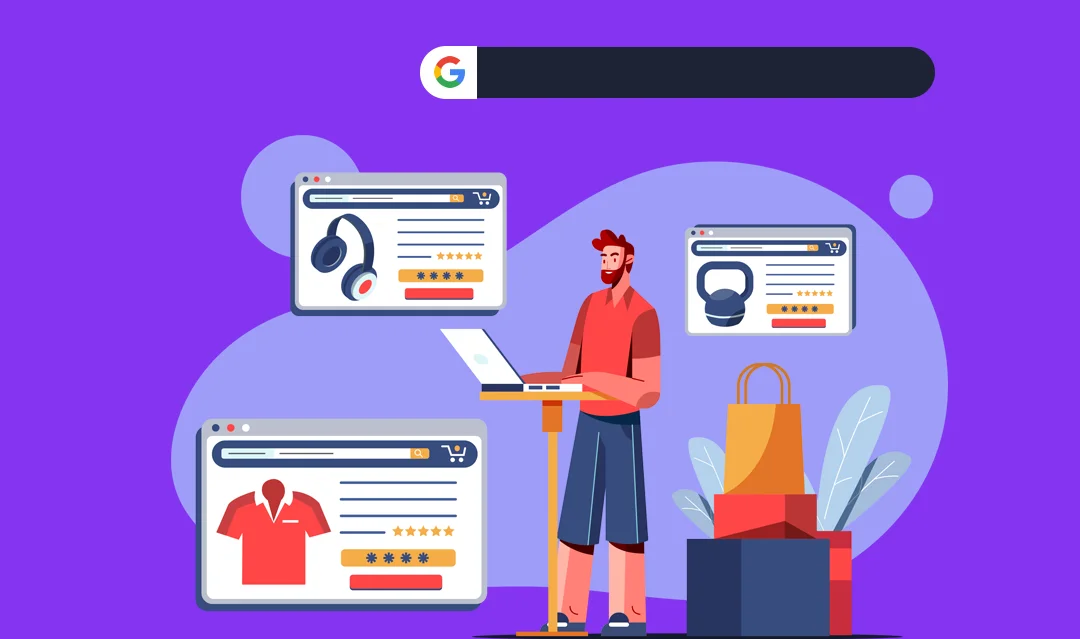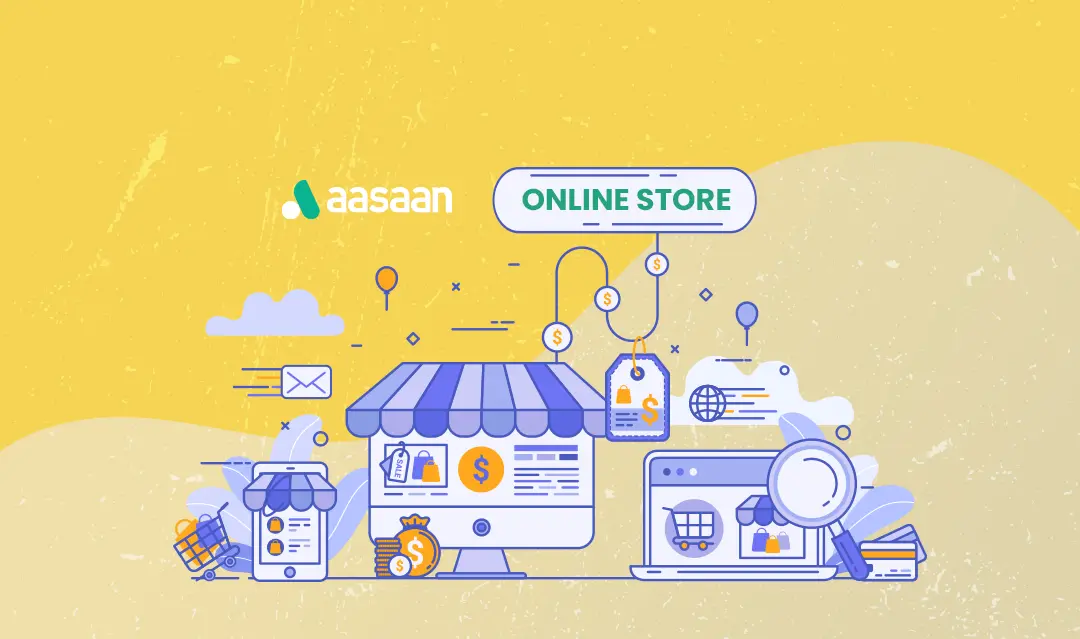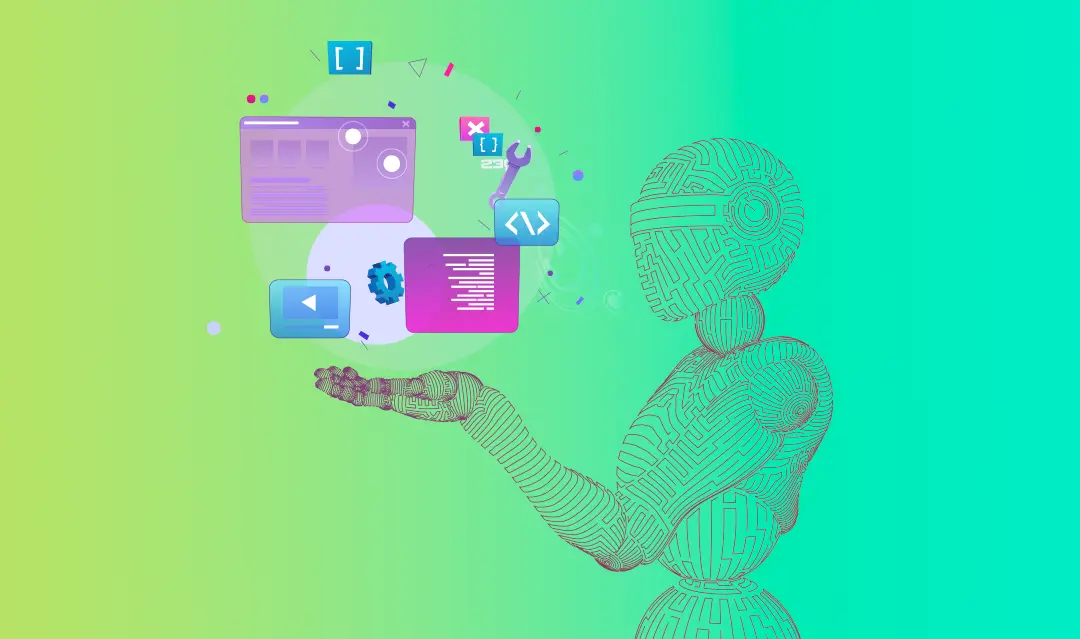
Top 15 AI Chatbot Business Ideas for 2024: Innovate Your Company with Interesting Chatbot Ideas
Imagine waking up to a dozen new leads in your inbox every day, without having to lift a finger. Or being able to provide 24/7 customer support without having to hire a team of agents. That’s the power of chatbots.
Chatbots are AI-powered programs that can simulate human conversation. They’re being used by businesses of all sizes to automate tasks, generate leads, and improve customer service.
And the best part is, you don’t need to be a tech whiz to start a chatbot business. There are a number of platforms that make it easy to create and deploy chatbots without any coding experience.
In this blog post, we’ll share 15 chatbot business ideas that you can start today. We’ll also provide tips on how to choose the right chatbot platform, develop a profitable business model, and market your chatbot business.
If you’re interested in starting a chatbot business, this article is for you.
Is chatbot business profitable?
Yes, chatbot businesses can be very profitable. In fact, the global chatbot market is expected to reach USD 1.25 billion by 2025, growing at a CAGR of 24.3% from 2020 to 2025.
There are a number of reasons why chatbot businesses are so profitable. First, chatbots can help businesses save money on labor costs. Chatbots can automate many tasks that would otherwise need to be done by human employees, such as answering customer questions and resolving issues.
Second, chatbots can help businesses improve their customer experience. Chatbots are available 24/7, and they can provide customers with the support they need quickly and efficiently. This can lead to increased customer satisfaction and loyalty.
Third, chatbots can help businesses increase their sales and marketing results. Chatbots can be used to generate leads, qualify prospects, and close deals. They can also be used to promote products and services and collect leads.
Overall, chatbot businesses are a very profitable investment. If you’re looking for a business idea that has the potential to be very lucrative, consider starting a chatbot business.
Why start a chatbot business?
Chatbots are a rapidly growing industry. In fact, the global chatbot market is expected to reach $1.25 billion by 2025. That’s a lot of opportunity for entrepreneurs.
Here are just a few of the benefits of starting a chatbot business:
- Chatbots are low-cost to develop and maintain. Once you’ve created your chatbot, you can deploy it on a variety of platforms for free or at a very low cost.
- Chatbots can automate repetitive tasks. This frees up your time to focus on more important things, like growing your business.
- Chatbots can generate leads and sales. Chatbots can be used to qualify leads, answer questions, and even close deals.
- Chatbots can improve customer service. Chatbots can provide 24/7 support to your customers and resolve their issues quickly and efficiently.
Who should start a chatbot business?
Chatbot businesses are a great fit for entrepreneurs who are:
- Passionate about technology and innovation.
- Able to think creatively and come up with new solutions.
- Excellent communicators and customer service providers.
- Organized and detail-oriented.
15 Best AI Chatbot Business Ideas To Enhance Your Company’s Success In 2024

1. Customer service chatbot
A customer service chatbot is a computer program that uses artificial intelligence (AI) and natural language processing (NLP) to simulate conversation with human users. It is typically used to provide customer service support, such as answering questions, resolving issues, and providing information.
Customer service chatbots can be used to automate a variety of tasks, such as:
- Answering frequently asked questions
- Providing information about products or services
- Troubleshooting problems
- Resolving customer complaints
- Escalating complex issues to human customer service representatives
Customer service chatbots offer a number of benefits to businesses, including:
- Reduced costs: Chatbots can help businesses to reduce their customer service costs by automating routine tasks.
- Improved customer satisfaction: Chatbots can help businesses to improve customer satisfaction by providing 24/7 support and resolving issues quickly and efficiently.
- Increased sales: Chatbots can help businesses to increase sales by qualifying leads and guiding customers through the sales process.
2. Lead generation chatbot:
A lead generation chatbot is a computer program that uses artificial intelligence (AI) and natural language processing (NLP) to generate leads for businesses. It typically works by engaging with website visitors and asking them questions to qualify them as potential leads. The chatbot may also collect contact information from the leads, such as their name, email address, and phone number.
Lead generation chatbots offer a number of benefits to businesses, including:
- Increased lead generation: It can help businesses to generate more leads by automating the lead qualification process and engaging with potential leads 24/7.
- Improved lead quality: It can help businesses to improve the quality of their leads by qualifying them based on their specific needs and interests.
- Reduced sales costs: It can help businesses to reduce their sales costs by automating the early stages of the sales process, freeing up sales reps to focus on more qualified leads.
Here is an example of how a lead generation chatbot might be used:
A company has a lead generation chatbot on its website. When a visitor lands on the website, the chatbot pops up and says:
“Hi, I’m a chatbot here to help you learn more about our products and services. What can I do for you today?”
The visitor clicks on the “Learn more about our products” button. The chatbot then asks the visitor a series of questions to qualify them as a potential lead, such as:
- What industry are you in?
- What are your biggest challenges?
- What are your goals for the next year?
Once the chatbot has qualified the visitor as a potential lead, it collects their contact information and sends it to the company’s sales team. The sales team can then follow up with the lead to learn more about their needs and see if they can help them achieve their goals.
Lead generation chatbots are a powerful tool that can help businesses to generate more leads and improve their sales process. As AI and NLP technologies continue to develop, we can expect to see chatbots become even more effective at lead generation.
3. Sales chatbot
It typically works by engaging with leads and answering their questions, guiding them through the sales process, and qualifying them as potential customers. Sales chatbots can also be used to automate tasks such as scheduling demos and appointments.
Sales chatbots offer a number of benefits to businesses, including:
- Increased conversion rates: Sales chatbots can help businesses to increase their conversion rates by engaging with leads quickly and efficiently, and by answering their questions in a timely manner.
- Reduced sales costs: Sales chatbots can help businesses to reduce their sales costs by automating routine tasks and freeing up sales reps to focus on more qualified leads.
- Improved lead qualification: Sales chatbots can help businesses to improve their lead qualification process by asking leads questions to assess their needs and interests.
- Enhanced customer experience: Sales chatbots can help businesses to enhance the customer experience by providing 24/7 support and by making it easy for leads to learn about their products and services.
Here are some additional benefits of sales chatbots:
- 24/7 availability: Sales chatbots are available 24/7, which means that they can help businesses to qualify leads and answer questions even when their sales team is not available.
- Personalization: Sales chatbots can be personalized to the needs of each individual lead. This means that they can provide more relevant information and recommendations.
- Scalability: Sales chatbots can be scaled to handle a large number of leads simultaneously. This means that businesses can use chatbots to grow their sales team without increasing their costs.
- Customer support: Chatbots can be used to provide customer support to potential customers. This can help to build trust and rapport with potential customers and make them more likely to buy from the company.
- Lead nurturing: Chatbots can be used to nurture leads by providing them with valuable information and content. This can help to keep the leads engaged with the company and move them closer to making a purchase.
Overall, sales chatbots are a valuable tool for businesses of all sizes. They can help businesses to increase their conversion rates, reduce their sales costs, improve their lead qualification process, and enhance the customer experience.
4. Ecommerce chatbot
An e-commerce chatbot is a powerful tool that can revolutionize the way businesses interact with their customers.
By integrating a chatbot into your e-commerce platform, you can provide your customers with real-time assistance, helping them find the products they’re looking for, addressing their queries, and even facilitating seamless order placement.
Here’s how an e-commerce chatbot can enhance the customer experience and boost your sales:
- Personalized Product Recommendations: By analyzing customer preferences, purchase history, and browsing behavior, an e-commerce chatbot can offer personalized product recommendations. This level of customization ensures that customers are presented with options that align with their interests, increasing the likelihood of making a purchase.
- Instant Customer Support: With an e-commerce chatbot, customers can receive instant responses to their inquiries. Whether it’s a question about product availability, shipping information, or return policies, the chatbot can provide accurate and prompt assistance, eliminating the need for customers to wait for human support.
- 24/7 Availability: Unlike traditional customer service channels with limited operating hours, an e-commerce chatbot operates round the clock. This means that customers can access support and make inquiries at any time, enhancing convenience and improving customer satisfaction.
- Streamlined Order Placement: An e-commerce chatbot can guide customers through the entire order placement process. By providing step-by-step assistance, the chatbot ensures a seamless and hassle-free experience, reducing the chances of cart abandonment and increasing conversion rates.
- Proactive Engagement: With the help of machine learning algorithms, an e-commerce chatbot can analyze customer behavior and preferences to proactively engage with customers. For example, the chatbot can send customized notifications about new arrivals, special offers, or abandoned carts, enticing customers to revisit your store and make a purchase.
- Data Collection and Analysis: An e-commerce chatbot can collect valuable customer data, such as purchase history, preferences, and feedback. This data can be analyzed to gain insights into customer behavior, allowing you to make informed business decisions and refine your marketing strategies.
By leveraging the capabilities of an e-commerce chatbot, businesses can create a more personalized and efficient shopping experience for their customers.
This not only improves customer satisfaction but also increases the likelihood of repeat purchases and positive word-of-mouth referrals, ultimately leading to higher sales and revenue.
Embrace the power of an e-commerce chatbot and witness the transformative impact it can have on your business.
Related: 10+ Best AI Website Builders : No Coding Needed

5. Real Estate chatbot
A real estate chatbot can be a game-changer in the real estate industry, offering a streamlined and efficient experience for potential buyers and renters.
By integrating a chatbot into your real estate platform, you can provide personalized assistance, facilitate property searches, address inquiries, and even schedule appointments with real estate agents.
Here’s how a real estate chatbot can help you save time and close more deals:
- Property Search Made Easy: With a real estate chatbot, potential buyers and renters can easily search for properties based on their preferences. The chatbot can ask questions about location, price range, property type, and other criteria to narrow down the options and present relevant listings. This simplifies the property search process and saves time for both users and agents.
- Instant Property Details: Instead of manually browsing through listings or waiting for a response from an agent, users can get instant property details from the chatbot. The chatbot can provide information about the property’s features, amenities, size, location, and any other relevant details. This quick access to information helps potential buyers and renters make informed decisions.
- Intelligent Recommendations: By leveraging machine learning algorithms, a real estate chatbot can analyze user preferences and behavior to offer intelligent property recommendations. The chatbot can suggest properties that closely match the user’s requirements and preferences, increasing the chances of finding the perfect property.
- Prompt Responses to Inquiries: Instead of waiting for an agent to respond to inquiries, a real estate chatbot can provide instant answers to common questions. Whether it’s about property availability, pricing, financing options, or any other query, the chatbot can offer accurate and prompt responses. This improves customer satisfaction and eliminates delays in the communication process.
- Appointment Scheduling: A real estate chatbot can streamline the appointment scheduling process by allowing users to book appointments with real estate agents directly through the chatbot. Users can check agent availability, select a suitable time slot, and receive confirmation, all within the chatbot interface. This saves time for both users and agents and ensures efficient coordination.
- Lead Generation and Qualification: A real estate chatbot can also act as a lead generation tool by collecting user information and qualifying potential leads. The chatbot can collect contact details, preferences, and other relevant information to understand user requirements and identify qualified leads. This helps agents prioritize their efforts and focus on leads with higher conversion potential.
By leveraging the capabilities of a real estate chatbot, real estate professionals can save time, improve customer satisfaction, and close more deals.
The chatbot’s ability to provide instant information, personalized recommendations, and seamless appointment scheduling enhances the overall home buying or renting experience.
Embrace the power of a real estate chatbot and witness the transformative impact it can have on your business.
6. Travel Chatbot
A travel chatbot can indeed be a valuable tool for travelers, providing assistance with various aspects of their journey. Here are some benefits of using a travel chatbot:
- Efficient Booking: A travel chatbot can streamline the booking process by allowing travelers to search for flights, hotels, and other travel services directly through the chatbot interface. Travelers can input their preferences, such as travel dates, destinations, and budget, and the chatbot can provide relevant options and facilitate the booking process.
- Instant Assistance: Travel chatbots can provide instant assistance to travelers by answering their questions about travel destinations, visa requirements, local attractions, and more. This saves travelers time and provides them with helpful information on the go.
- Personalized Recommendations: By analyzing traveler preferences and behavior, a travel chatbot can offer personalized recommendations for destinations, hotels, restaurants, and activities. This enhances the travel experience by providing tailored suggestions based on individual preferences and interests.
- 24/7 Availability: Travel chatbots are available round the clock, allowing travelers to access information and make bookings at any time, regardless of time zones or business hours. This ensures continuous support and convenience for travelers, especially in urgent situations or during unexpected changes in travel plans.
- Language Support: Travel chatbots can offer multilingual support, allowing travelers to communicate and receive assistance in their preferred language. This eliminates language barriers and enhances the overall customer experience for international travelers.
- Travel Updates and Notifications: A travel chatbot can keep travelers informed about flight delays, gate changes, weather updates, and other important travel notifications. This helps travelers stay updated and make necessary adjustments to their plans in real-time.
- Post-booking Support: Travel chatbots can provide post-booking support, assisting travelers with itinerary management, booking modifications, cancellations, and other travel-related inquiries. This ensures a seamless and hassle-free experience throughout the entire travel journey.
By leveraging the capabilities of a travel chatbot, travel companies can enhance customer satisfaction, streamline booking processes, and provide personalized recommendations and assistance to travelers.
The convenience, efficiency, and 24/7 availability of a travel chatbot can greatly improve the overall travel experience for customers.
7. Restaurant Chatbot
A restaurant chatbot can be a valuable tool for both customers and restaurant owners, providing various benefits to enhance the dining experience. Here are some advantages of using a restaurant chatbot:
- Efficient Ordering: A restaurant chatbot can streamline the ordering process by allowing customers to browse the menu, place orders, and customize their meals directly through the chatbot interface. This reduces wait times, eliminates the need for phone calls, and ensures accurate order placement.
- Menu Recommendations: By analyzing customer preferences and order history, a restaurant chatbot can offer personalized menu recommendations to customers. This helps customers discover new dishes and enhances their dining experience by suggesting items they are likely to enjoy.
- Reservation Management: A restaurant chatbot can handle table reservations, allowing customers to book tables conveniently through the chatbot interface. This eliminates the need for phone calls and minimizes the chances of errors in reservation details.
- Bill Payment: A restaurant chatbot can facilitate bill payments by providing customers with an easy and secure payment process. Customers can view their bill, split payments, and make payments directly through the chatbot, saving time and providing a convenient dining experience.
- Instant Assistance: Restaurant chatbots can provide instant assistance to customers by answering their questions about the menu, ingredients, allergens, and dietary restrictions. This helps customers make informed decisions and ensures a smooth dining experience.
- Feedback and Reviews: A restaurant chatbot can collect feedback and reviews from customers, allowing them to share their dining experience and provide valuable insights to the restaurant. This helps restaurant owners improve their services and address any concerns promptly.
- Promotions and Special Offers: Restaurant chatbots can inform customers about ongoing promotions, special offers, and discounts. This helps increase customer engagement, encourages repeat visits, and boosts customer loyalty.
- 24/7 Availability: With a restaurant chatbot, customers can access information, place orders, and make reservations at any time, even outside of the restaurant’s operating hours. This ensures continuous support and convenience for customers.
By leveraging the capabilities of a restaurant chatbot, restaurant owners can enhance customer satisfaction, streamline operations, and provide personalized recommendations and assistance to customers.
The efficiency, convenience, and personalized experience provided by a restaurant chatbot can significantly improve the overall dining experience for customers.
8. Booking chatbot
A booking chatbot can be a valuable tool for customers to schedule appointments with various businesses, including salons, spas, and doctors’ offices. Here’s how a booking chatbot can assist customers and enhance their experience:
- Appointment Scheduling: A booking chatbot simplifies the appointment scheduling process by allowing customers to book appointments directly through the chatbot interface. Customers can specify their preferred date, time, and type of service, and the chatbot can provide available options and confirm the appointment.
- Service Information: Customers can ask the booking chatbot questions about the business and its services. The chatbot can provide details about different treatments, procedures, or services offered, including descriptions, duration, pricing, and any special requirements.
- Availability and Waitlists: The booking chatbot can check the availability of appointments based on the customer’s preferred date and time. If no immediate slots are available, the chatbot can offer to add the customer to a waitlist and notify them when a suitable appointment becomes available.
- Reminders and Notifications: Once an appointment is scheduled, the booking chatbot can send reminders and notifications to the customer. This helps reduce no-shows and ensures that customers are well-prepared for their appointments.
- Rescheduling and Cancellations: If customers need to reschedule or cancel their appointments, they can interact with the booking chatbot to make the necessary changes. The chatbot can provide options for rescheduling or help guide customers through the cancellation process.
- FAQs and Assistance: Customers can ask the booking chatbot general questions about the business, such as operating hours, location, parking facilities, or any specific policies. The chatbot can provide instant responses or direct customers to relevant information.
- Integration with Calendars: The booking chatbot can integrate with customers’ calendars to add the scheduled appointments automatically. This helps customers keep track of their appointments and avoids any scheduling conflicts.
- Personalization and Recommendations: By analyzing customer preferences and previous appointments, the booking chatbot can offer personalized recommendations for services or suggest additional treatments that may be of interest to the customer.
A booking chatbot simplifies the appointment booking process, provides convenience to customers, and reduces the workload for businesses by automating scheduling tasks.
It enhances customer satisfaction, improves operational efficiency, and helps businesses effectively manage their appointment bookings.
9. Social Media Chatbot for Engaging Followers
A social media chatbot can be a valuable tool for businesses to engage with their followers on social media platforms, answer their questions, and promote products or services. Here’s how a social media chatbot can help you increase brand awareness and drive traffic to your website:
- Instant Customer Interaction: A social media chatbot allows you to provide instant responses to your followers’ messages and comments. It can answer frequently asked questions, provide information about your products or services, and offer assistance in real-time. This helps improve customer satisfaction and engagement.
- 24/7 Availability: Unlike human agents who have limited working hours, a social media chatbot can be available 24/7. This ensures that your followers receive immediate responses to their inquiries, regardless of the time of day. It creates a positive user experience and builds trust in your brand.
- Personalized Recommendations: By analyzing user data and preferences, a social media chatbot can offer personalized product recommendations to your followers. It can suggest relevant products based on their interests, previous purchases, or browsing history. This enhances the customer experience and increases the likelihood of conversion.
- Lead Generation: A social media chatbot can collect user information and generate leads for your business. It can ask followers to provide their contact details or subscribe to your newsletter, allowing you to nurture those leads and convert them into customers. This helps expand your customer base and grow your business.
- Promotional Campaigns: A social media chatbot can assist in promoting your products or services by delivering targeted messages or offers to your followers. It can notify them about new product launches, discounts, or upcoming events. This helps create a sense of exclusivity and encourages followers to take action.
- Content Distribution: A social media chatbot can deliver content directly to your followers. It can share blog posts, videos, or other valuable resources, keeping your audience informed and engaged. This drives traffic to your website and positions your brand as a thought leader in your industry.
- Feedback and Surveys: A social media chatbot can gather feedback from your followers and conduct surveys to gain insights into their preferences and opinions. It provides an opportunity to understand your audience better, make improvements based on their feedback, and tailor your offerings to their needs.
- Analytics and Insights: By tracking user interactions and analyzing data, a social media chatbot can provide valuable insights into your followers’ behavior and preferences. It helps you understand which content or campaigns are performing well and make data-driven decisions to optimize your social media strategy.
A social media chatbot streamlines customer interactions, enhances engagement, and helps businesses effectively promote their products or services on social media platforms.
It improves customer satisfaction, increases brand awareness, and drives traffic to your website, ultimately contributing to business growth.
10. Medical Chatbot for Patient Support
A medical chatbot can be a valuable tool for providing patients with information about their health conditions, medications, and treatments. It can also assist them in scheduling appointments and answering their questions about healthcare. Here’s how a medical chatbot can benefit patients:
- Accessible Information: A medical chatbot can provide patients with instant access to information about their health conditions. Patients can ask questions about symptoms, treatment options, and medication instructions, and the chatbot can provide relevant and accurate information in real-time. This empowers patients to make informed decisions about their healthcare.
- Appointment Scheduling: A medical chatbot can help patients schedule appointments with healthcare providers . Patients can interact with the chatbot to find available time slots, book appointments, or reschedule/cancel existing appointments. This saves time for both patients and healthcare providers and improves the efficiency of the scheduling process.
- Medication Assistance: Patients can use a medical chatbot to obtain information about their medications. They can ask questions about dosage, potential side effects, drug interactions, and proper usage. The chatbot can provide clear and concise information, helping patients understand their medications and adhere to their prescribed treatment plans.
- Healthcare FAQs: A medical chatbot can answer frequently asked questions about healthcare. Patients can inquire about common medical conditions, preventive measures, or general health advice. The chatbot can provide evidence-based information and educational resources to promote health literacy among patients.
- Remote Monitoring: In certain cases, a medical chatbot can assist in remote monitoring of patients’ health conditions. Patients can report their symptoms, vital signs, or medication adherence through the chatbot, and healthcare providers can review the data for ongoing care management. This enables timely interventions and reduces the need for frequent in-person visits.
- Healthcare Guidance: A medical chatbot can guide patients through various healthcare processes or procedures. It can provide step-by-step instructions for medical tests, preparation for surgeries, or post-operative care. This helps patients feel more prepared and informed, reducing anxiety and improving the overall patient experience.
- Health Promotion: A medical chatbot can offer personalized health recommendations and tips to patients. It can provide guidance on healthy lifestyle choices, preventive measures, and disease management strategies. This empowers patients to take an active role in maintaining their health and well-being.
It’s important to note that while medical chatbots offer convenience and accessibility, they should not replace the expertise and personalized care provided by healthcare professionals.
Medical chatbots should be seen as a complementary tool that enhances patient support and engagement.
Conclusion:
As technology continues to advance, chatbots will increasingly play an integral role in diverse sectors such as social media and healthcare.
From streamlining businesses’ customer interactions, driving website traffic, and effectively promoting products on social media platforms, to providing prompt patient support by offering accessible information, assisting with appointment scheduling, and promoting health literacy, chatbots can truly reshape operational efficiencies for businesses and healthcare providers alike.
However, the critical aspect to remember is to use these tools as complementary additions to human services, not replacements. With a strategic and balanced implementation, chatbots have the potential to fuel the next significant wave of service delivery and customer/patient engagement.
FAQ’s:
1. What businesses can you start with AI?
You can start a variety of businesses with AI, depending on your interests and expertise. Some ideas include:
- AI Development Services: Providing customized AI solutions to other businesses.
- AI-driven Products: Creating products powered by AI, like chatbots, recommendation systems, or automation tools.
- AI Consulting: Offering consulting services to companies looking to integrate AI into their operations.
- AI Education and Training: Teaching individuals or corporate teams about AI and machine learning.
- AI in Healthcare: Developing AI applications to improve medical diagnosis, treatment planning, and patient care.
- AI in Finance: Creating algorithms for risk assessment, fraud detection, or investment strategies.
2. How do I start an artificial intelligence business?
Starting an AI business involves several steps:
- Identify a Niche: Find a specific area where AI can add value, and where you have expertise.
- Gain Relevant Skills: Acquire or strengthen your skills in AI, machine learning, and data science.
- Build a Team: Assemble a team of knowledgeable individuals who complement your skills.
- Develop a Business Plan: Create a plan outlining your business model, target market, and financial projections.
- Create a Minimum Viable Product (MVP): Build an MVP to showcase your AI solution to potential customers.
- Secure Funding: Look for funding opportunities to support your startup, like grants, loans, or venture capital.
- Market Your Business: Promote your business to attract customers and grow your clientele.
3. What can AI do for small business?
AI can significantly benefit small businesses in several ways:
- Automation: Automating routine tasks to save time and resources.
- Data Analysis: Analyzing data to gain insights into customer behavior and market trends.
- Customer Service: Using AI chatbots to improve customer service and engagement.
- Personalization: Delivering personalized experiences to customers through AI-driven recommendations.
- Marketing Optimization: Enhancing marketing strategies through predictive analytics and automated campaigns.
4. Is an AI company profitable?
The profitability of an AI company can vary widely based on the industry, the specific AI technologies involved, and the company’s ability to effectively meet market demands. However, with the growing reliance on AI across various sectors, there is a significant potential for profitability for AI companies. It’s crucial to conduct thorough market research, develop a solid business plan, and continuously innovate to stay competitive in the rapidly evolving AI landscape.








